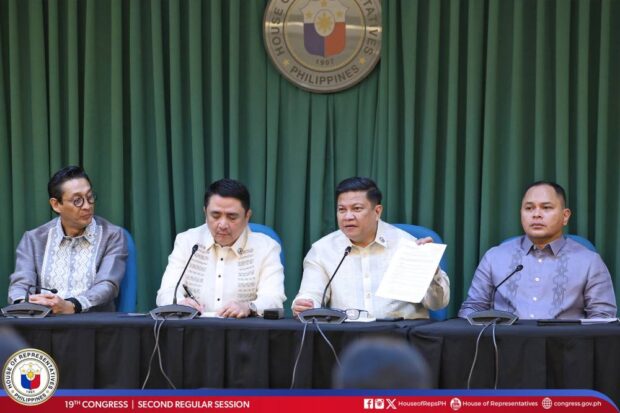What’s next after RBH 7 approval in House? Solons explain upcoming steps

House leaders file Resolution of Both Houses (RBH) No. 7, which has the exact same provisions with that of the Senate’s RBH 6. (File photo dated February 19, 2024 from House of Representatives Facebook Page)
MANILA, Philippines — After the House of Representatives approved Resolution of Both Houses (RBH) No. 7 on third and final reading on Wednesday, the measure was ordered forwarded to the Senate.
So what’s next for the House?
According to Deputy Majority Leader and Tingog party-list Rep. Jude Acidre on Thursday, the House will sit and wait, noting that they have faith that the Senate would act on their version of the proposed constitutional amendments in RBH No. 6.
“For the RBH 7, as far as the House is concerned, we’ve already fulfilled our mandate. We have passed the bills and the RBH. We have passed the resolution and we have already forwarded it to the Senate,” Acidre said in a press briefing at the Batasang Pambansa complex.
“Now, we’re looking at our friends in the upper House of what they will do because as they insist, Congress is a bicameral body and the actions of the House have to be reciprocated by the Senate,” he added.
Acidre said they are still optimistic because members of the Senate leadership were actually behind RBH No. 6 — which supposedly indicates that it has a higher chance of being approved.
However, he gave a gentle reminder to the Senate that Congress is facing time constraints because after the State of the Nation Address (Sona), the focus would be on the budget deliberations.
“We have full trust considering that RBH 6 is authored by the Senate President, by the Senate Pro Tempore, by the Majority leader and the chairman of the sub-committee. I have full trust in their capacity to convince their peers in the upper House, knowing that as [RBH No.] 7 actually states, this is something that will be good for the country,” he said.
“However, we have to understand there is a limited time frame to do this. As many of us actually know, the elections are coming, and we already cited that the most favorable time is for this to be passed before the Congress adjourns sine die. So, those are the things that we’re looking at, the deadlines, we cannot say that we’re imposing on the Senate, but this is a reasonable time frame for them,” he added.
RBH No. 7 was approved on third reading on Wednesday, with 287 affirmative votes from lawmakers.
Eight of the lawmakers present voted against it, while two abstained.
If RBH No. 6 and RBH No. 7 are ratified by voters in a plebiscite handled by the Commission on Elections, three provisions of the 1987 Constitution would be amended by adding the phrase “unless otherwise provided by law:”
Section 11 of Article XII (National Patrimony and Economy), where the phrase “unless otherwise provided by law” is inserted in the provision that bars foreign ownership of a public utility shall except in a case where 60 percent of the total capital belongs to Filipino citizens;
Section 4 of Article XIV (Education, Science and Technology, Arts, Culture, and Sports) where the phrase “unless otherwise provided by law” is inserted in the provision that bars foreign ownership of basic educational institutions except in a case where 60 percent of the total capital belongs to Filipino citizens;
Section 11 of Article XVI (General Provisions) where the phrase “unless otherwise provided by law” is inserted in two portions:
First, the provision that bars foreign ownership in the advertising industry, except in a case where 70 percent of the total capital belongs to Filipino citizens;
And in the provision that limits foreign investors participation in entities to how much their capital share is.
READ: House approves RBH 7 on third reading
Once ratified, Congress would have the power to set the rate of foreign ownership for the industries of public utilities, basic education, and advertising.
However, there have been concerns as to whether the Senate can approve RBH No. 6 on time, given that they have preferred to discuss priority measures first.
Last Monday, Deputy Speaker David Suarez called on leaders of the House and Senate to meet during the Holy Week break to discuss next steps, amid fears that Congress may be running out of time to amend the 1987 Constitution.
Suarez said this is in consideration of possible constitutional challenges that the proposed amendments may face.
READ: Solon hopes House, Senate can meet on Cha-cha during Holy Week break
READ: Garin thinks ‘some’ pray 2025 polls noise to bury Charter change talks